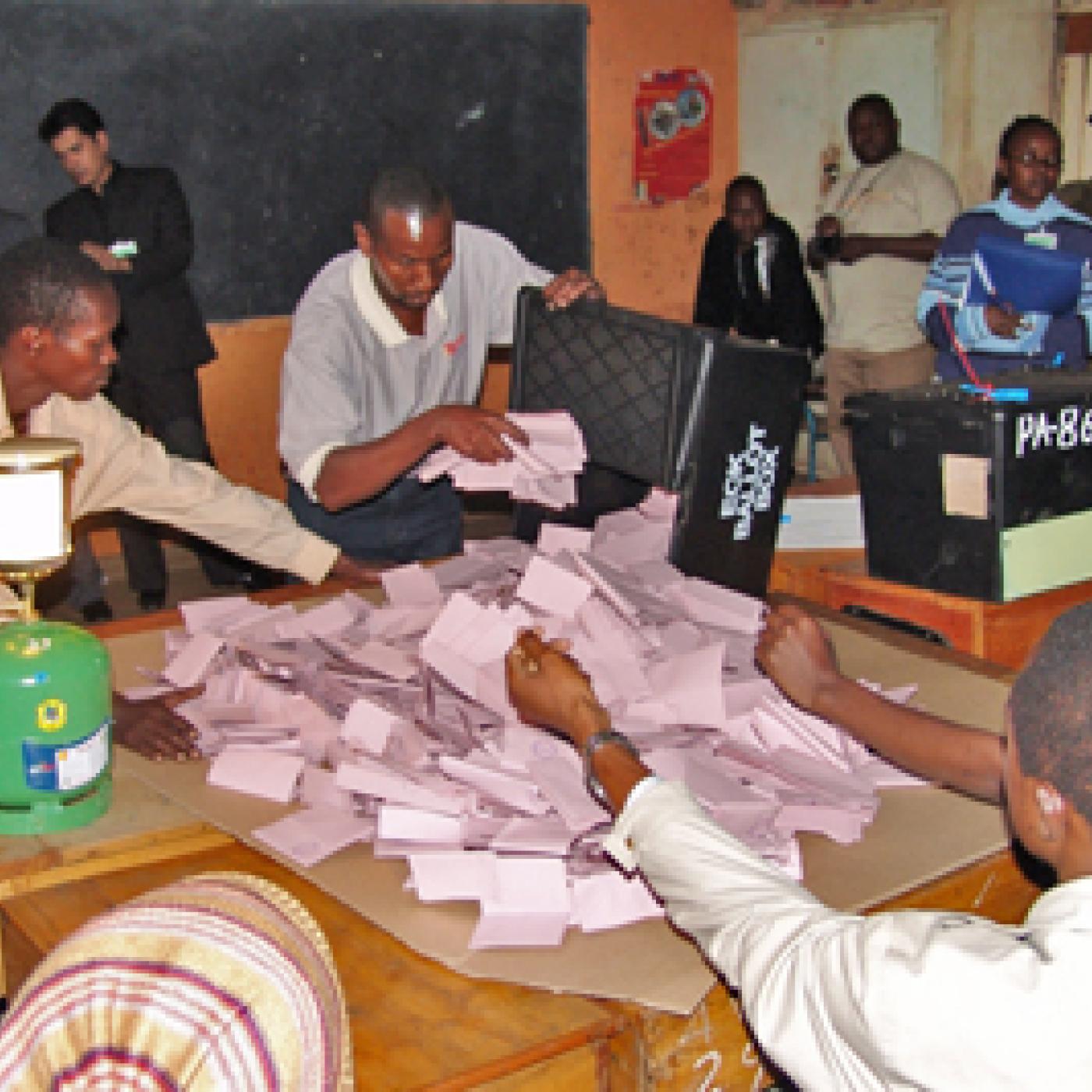
Kenya Electoral System Support (KESS)
From 2014 to 2018, the Kenya Electoral System Support (KESS) program supported Kenyans and government institutions in pursuing the inclusive vision of democracy put forth by the constitution of Kenya (2010) where all voters are fully enfranchised. IFES worked with a network of local partners, such as the Independent Electoral and Boundaries Commission (IEBC), other government institutions and several civil society organizations (CSOs) to increase the participation and representation of Kenyan voters, especially women, youth and those with disabilities, in the electoral process.
Key Outcomes
- Increased participation of women, people with disabilities and young people. IFES' evidenced-based civic and voter education programming empowered more people, especially those traditionally marginalized, to effectively participate in their democracy, including the successful lobbying efforts of women living with disabilities.
- Increased voter turnout. IFES conducted a post-election survey in 2015 following the 2013 election and another in 2018 following the 2017 election. The comparison of the survey data indicated 10 percent increase in voter turnout in the counties where IFES provided voter outreach.
- Improved efficiency in voter registration. IFES worked with the IEBC to facilitate the voter registration process by exploring data sharing options with the National Registration Bureau (NRB) and other relevant government agencies. Data sharing and the integration of systems between the various agencies helped improve efficiency during the voter registration and verification processes.
- Enhanced functionality and sustainability of election technology. IFES assisted the IEBC’s with its strategy for the sustainable maintenance, storage and redeployment of election technology.
- Expanded civic education and engagement. IFES and IEBC partnered to pilot new, adaptive strategies to reach children in public schools, women and youth at institutions of higher learning and informal settlements, through peer-to-peer, door-to-door and social media campaigning.
In addition, campus-based initiatives under KESS (2014-2018) trained over 300 campus ambassadors across 60 universities, reaching over 300,000 youth through innovative avenues, including sport activities, concerts, university radio shows and social media campaigns.
Changamka Na Sanaa: Art and Voter Outreach in Informal Settlements
IFES also undertook an outreach campaign, Changamka Na Sanaa, in informal settlements in Nairobi, Kisumu, Nakuru and Mombasa which targeted women and youth through graffiti art installations. While graffiti had previously been used for social justice initiatives, this was the first time it was being used as a messaging tool around elections. IFES also piloted voter education initiatives targeting women from the informal settlements in Embakasi Central constituency (Kayole and Soweto). The area is characterized by some of the largest informal settlements in Nairobi county that often receive fewer interventions from other organizations. IFES trained a group of 78 Chama women (a self-help group) as voter educators. These women then mobilized their community to register and vote, reaching over 16,000 potential voters in churches, saloons, open air markets, and recreation centers. This was the first time that IEBC was able to engage with these communities in this way. Following the election, the Chama women, together with select male allies, underwent a training on county budget procedures and opportunities for continued engagement to influence county-level decision-making on an ongoing basis.
Women with Disabilities Advocate for Policy Change
Expanding the program’s reach to women with disabilities, KESS focused on the creation of the first consolidated set of priorities to advance lobbying efforts on national policies by women with disabilities. In collaboration with a local partner - Women Challenged to Challenge (WCC) - the policy platform document will sustain advocacy efforts for women with disabilities past the implementation period of KESS by outlining steps for engagement with government officials and local political structures. It has Kenya Electoral System Support Final Report been presented to 15 government officials with disabilities and widely distributed in accessible formats, including braille, embedded Alt-text6 and audio versions.
Alternative text or “alt text” are brief descriptions of the content of images, graphs and charts that is displayed when an image is not visible on the page. It provides persons using screen readers with text equivalent to the images, and they can also be able to hear the alt tag in place of the image.
Voter Passports for Women and Youth
The creation of easy-to-use materials that resonate with target audiences is a KESS strategy that has been applied across the program. For example, a Youth Voters Passport-Mwakenya Edition was designed by IFES in conjunction with University of Nairobi students and another version of the passport - the Voters Passport – Mabinti Edition was specifically designed for women. IFES’ Citizen Engagement Guidebook provided a simple and easy guide on how to engage with county government budgeting and development process. The Youth Congress, a local youth-based organization with national outreach to youth in informal settlements, has since adopted the guidebook for continued use past the implementation period of KESS.
Election Technology and Interagency Collaboration
In the area of technology, in 2015 and 2016 IFES helped the IEBC conduct a technology assessment that provided a technology maintenance schedule and defined security and environmental requirements for equipment storage. IFES further completed an election technology inventory audit to help the IEBC update the functionality of its technologies for the 2017 MVR exercise. This proved useful in the quick deployment of open kits to mobile and on-campus registration centers.
Through IFES’ efforts that encouraged interagency collaboration between IEBC the Civil Registry Department in Kenya, the IEBC during its post-election evaluation following the 2013 election cycle identified the need to put in place legal measures that improve the accuracy of the voter register and lay out regulations for data sharing between themselves and relevant agencies. This includes addressing the methodology and mechanisms for enhancing the register, among others. While the law provides for this process to be undertaken, there is still room for follow on regulations that guide the still required process.
In addition, IFES supported the IEBC, NRB, Civil Registry Department and Ministry of Interior collaboration to develop a data sharing policy outlining the different government agencies’ responsibilities in inter-agency data sharing and data dissemination to external stakeholders. This policy facilitated the NRB’s data sharing of deaths reported since the 2012 voter registration to the IEBC, who then used the data to update the 2017 voter register.
One of the key successes of IFES’s technology assistance was the creation of the Election Technology Advisory Committee (ETAC), which was anchored in the election amendment laws. This committee was proposed by IFES following the 2013 election, and the concept slowly gained acceptance by the Chief Election Officer (CEO) and the Information and Communications Technology (ICT) Director through many discussions over the period of the KESS program. This committee was conceived as a mechanism to obtain input from a broadly representative group of political stakeholders and technology experts, both to assist International Foundation for Electoral Systems IEBC in planning and decision-making and to shield them from accusations that they had not been proactive and/or that the technology planning was inadequate. Once ETAC was formed, KESS’ Technical ICT Advisor participated as a non-voting international elections technology expert in ETAC and supported the IEBC draft the terms of reference for members that would constitute the Committee. This later also laid groundwork for IFES’ continued support to the IEBC related to election technologies through the USAID-funded KEAP.
Lessons Learned
The lessons learned from the KESS program implementation call for further commitment in long-term electoral assistance. For example, civic education to encourage participation in elections, but more importantly increase public education on the avenues for post-election engagement with elected individuals/bodies. The project gained appreciation for continuous data collection to inform tailored approaches and deal with a fluid electoral environment. With a population of approximately 80% below 35 years of age, civic and voter education programs should be forward looking with focus on promoting a stronger sense of patriotism amongst the electorate, and further provide citizens an opportunity to appreciate elections as a cycle and not as an event.




